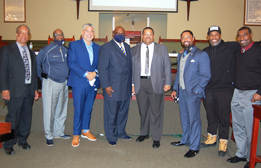
By Tricia Hall
Sojourner’s Truth Reporter
Toledo’s NAACP organized a community conversation on Tuesday, January 11 to discuss violence in the community.
The dialog featured four local panelists: Judge Ian English, Lucas County Common Pleas Court; JoJuan Armour, City of Toledo Commissioner of Administrative Services; Romules Durant, EdD, Superintendent of Toledo Public Schools and Keary Sarabia, CEO of RFS Behavioral Mental Health. The conversation moderator was Fletcher Word, editor of The Sojourner’s Truth.
Rev. Willie Perryman, local NAACP president, opened the meeting and delivered a prayer. “I want to welcome all of you that have joined us here and on the live stream. Let’s have a real community conversation. We want safer community, we don’t want any more violence, and want this gathering to help our community.”
The moderator opened the program by stating the statistics about gun violence before addressing specific questions to each of the panelist. “Let’s talk about gun violence, there were 71 homicides in 2021 and 61 in 2020,” said Word.
Judge English grew up in Toledo and worked this way through the legal profession before earning his position was a judge. He described the existence of gun violence in the Black community as a threat to the existence of Black people. He later explained how the age and gender of defendants is shifting since he began his career in 1993 and when he became a judge in 2015.
“Let’s define the problem and talk about the well-being of our people. It’s difficult to explain how serious the circumstances are in our community. We’re fighting to save our existence. These shootings can result in grief from two families if the prosecution is successful,” said English.
“The defendants are younger, especially the ones transporting the guns. There’re also more women that are involved but the court system has pushed back against incarceration for possession because it takes the person away from their job and family. There are neighborhoods in Toledo, especially the ones that JoJuan is working in, that feel a weapon is needed to defend themselves,” he continued.
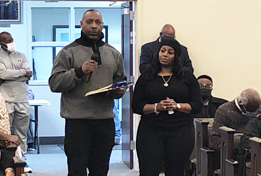
“There were 1,300 shootings last year in Toledo, but the solve rate is low which means that those cases don’t make it to court. The majority of these shootings are begin committed by a small group. A small and narrow problem can lead to violence in our streets but we need to move past this and demand results. We need to treat this like an epidemic and commit the resources,” English explained.
Toledo Public Schools recently announced the district’s plan for the three “Rs.” District superintendent Romulus Durant, EdD explained why this plan is necessary and immediate next steps. He also addressed the current resources that are available to students to address mental health and current collaboration efforts to address access to guns near school grounds.
“The three Rs are restart, refocus and respect, because we redesigned a program to address student behavior and accountability. We recognized that we need to stay out of remote learning, because there’s devastating effects on impoverished neighborhoods. The students were spending six to eight hours with us, where they ate, learned and had recreational time. Remote learning allowed the teachers to see the trauma in some of those homes, which could make it harder for the student to escape from later. We need the community to be engaged,” explained Durant.
“We’re looking for more men to mentor, we support Mr. Armour and his staff, so whenever space is needed, we support him. When Toledoans United for Social Action (TUSA) asked us to train our teachers in social and emotional learning, we did that. We don’t just talk about it, but be about it,” said Durant.
“There are mental health specialists in each school and the high schools have health centers. If a parent or guardian knows that a student needs services, let us know. We need to take back our communities,” he added.
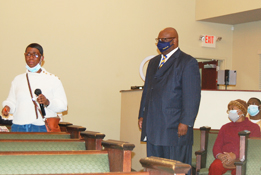
“We collaborate with community partners for a Friday weapon’s check where a group canvasses and collects weapons. That’s just one of our proactive approaches. We plan to offer more satellite programs and reconnect with the faith-based community to recruit more volunteers. For example, The Movement and Tina Butts will mentor students and we’re meeting with CityPark League. We will hold press conferences once details are finalized,” said Durant.
Mental health expert Keary Sarabia, also grew up in Toledo, began by providing background information on how the pandemic could impact children and explain that kids today have different types of peer pressure.
“The pandemic exacerbated trauma for kids but social media did allow kids to engage with each other. Addressing mental health isn’t the sole solution, but in conjunction with other programs and education. Kids tell me how violent it is out there. But it does start at home. A first-grader isn’t a reason why that kid is late or doesn’t have a coat at school. The earlier a child gets into mental health programs, they will have better outcomes verses older children,” said Sarabia.
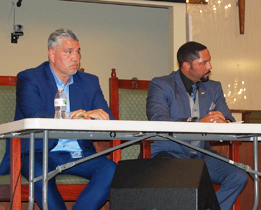
The City of Toledo hired Toledoan JoJuan Armour to focus on youth violence. His charge was to address the issue in the Junction neighborhood with four violence interrupters, but currently the department has only two and still saw a decrease in neighborhood shootings. Armour described the current state of his team’s work in the neighborhood, how trust is built and the culture of violence.
“Gun violence isn’t just one thing, there isn’t just one answer because the answer is just as detailed as the problem. I’m a prevention advocate and social emotional learner. That means Junction is different than north Toledo or east Toledo. One hundred percent of the gun violence incidents in Toledo were based off an argument! These youth aren’t able to de-escalate. There needs to be a wholistic approach and understand that we can’t save them all but we can save a lot. Gun violence has been around sine the Cowboy days but we need to revive community volunteer programs,” explained Armour.
“Marginalized communities distrust historically. We don’t trust medicine or law enforcement. We don’t trust government or voting because black folks have been undercounted. But we need to build up medicine, law enforcement, government and voting because not participating hurts us. Transparency is how we build trust,” said Armour.
“The culture of gun violence is glamorized but the first ones that aren’t in that lifestyle get knocked down and will take credit for the body. Real criminals that live this life don’t plan and there is so much lack of respect in this world. They will die for their friends but won’t live for their mothers,” added Armour.
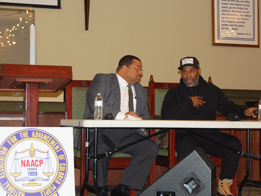
In addition to the panel comments, three mothers whose children were murdered due to gun violence addressed the panel and audience. LaShawnda Kinnebrew’s son Christopher was murdered on July 3 she and shared her frustrations about the status of the unsolved murder. Brandi Hopkin’s son Jahneil Douglass was shot and murdered over two years ago, but the case is in limbo because the shooter claims self-defense. Robin Copeland’s son Deshaun Lee was murdered in 2010 and she shared how she celebrates his life even though his case is unsolved.
“I want the community and police to help me. I have sleepless nights. I don’t want another mother to go through what I have gone through, but I still want justice for my son,” shared Kinnebrew.
“The defendant was caught and admitted to the shooting but has claimed self-defense. My son was attending the University of Toledo and whenever his friends see the shooter, they call me, and I explain he’s on house monitoring. Even though house monitoring is satellite and he can go anywhere in Toledo. I understand wearing a smile on your face when you’re tore up inside. My son only had his keys, not a gun,” said Hopkins.
“I don’t want another mother to know what I felt. I don’t want the mother of that person who killed my son to know how I feel. We need to stop all this madness, it’s just escalated since 2010. His case is still unsolved and every year I celebrate his birthday to remind people that his case is unsolved and to celebrate his life,” added Copeland.
The hybrid conversation was held in-person at Jerusalem Baptist Church on Dorr Street and streamed live on the NAACP Toledo’s Facebook page.

